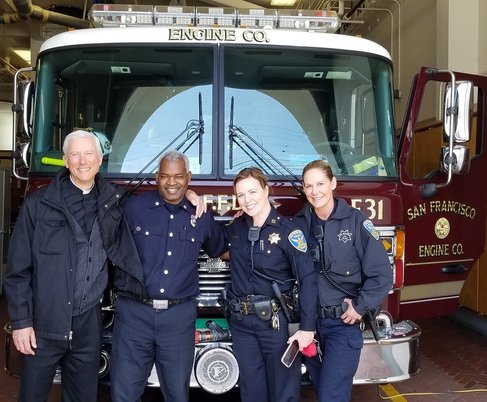 The local fire captain welcomed me over for lunch last month!
The local fire captain welcomed me over for lunch last month! I’ve been back East visiting my brother and I wanted to join his parish for morning Mass. Fifteen years ago, a priest would be welcome at Mass. Perhaps he would need to show his celebret (priest ID card), but the Church was happy to have visiting priests join them in worship. Since the clergy scandals came to light in 2002, however, for obviously good reasons the ID card is not enough. It’s easy enough to fake an ID card. But if the visiting priest is known personally by someone in the community as a man of good character, he may concelebrate for a day or two if he has a valid celebret. If the priest cannot be personally vouched for by someone of the community, he must provide a letter of good standing from his bishop. This is a necessary safety measure, and I had requested a letter of good standing from my archdiocese. I would never allow an unknown priest to concelebrate in my parish without the letter of good standing.
When we got to the parish office, the nice ladies could not find the requisite letter. Maybe it didn’t get sent (everyone is busy and maybe the chancery didn’t even get my email). Maybe the mail system didn’t deliver it. Maybe it got lost. My brother is well-known in the parish, serving as extraordinary minister of Holy Communion; his wife served on Parish Council. The pastor knows them well. So my brother explained that I was his brother, that I had a current celebret card, and suggested I might concelebrate based on his recommendation. No, the secretaries said, without the official letter I would not be welcome to concelebrate. A priest should offer Mass every day, either as celebrant or concelebrant, as Vatican II, canon law, and the great popes have all urged. He offers Mass, not just attends Mass, in order to exercise his priestly identity and service to the Church. Each Mass is an inestimable gift to the whole People of God, and a priest who attends Mass as a congregant rather than offering it as a priest misses that opportunity to serve as a priest. So my brother and I drove back home and I offered Mass at his home.
I think in cases like this prudence has focused so much on eliminating risk that we have essentially compromised hospitality. This particular New Jersey parish is welcoming in many ways—a large parking lot, clear signage, a professional office staff, a wide open church, clean bathrooms. But more than policies and procedures, hospitality is an attitude. Certainly it involves a risk that one’s hospitality will be exploited—you take that risk every time you invite someone for dinner or say hello to a stranger. But the Church should take at least a little risk rather than succumb to suspicion and fear and, as they say today, “exclusion.” If a visiting priest is known by members of a parish as trustworthy, a priest ID card should be enough to at least allow him to join the parish priests at the altar. We should keep our churches open all day even though a person might occasionally steal the candle money. Jesus certainly took a risk in welcoming people into his life (and eventually got killed for taking this risk). But He took the risk in order to bring the love of God to all the people. We have prudently made our churches more secure, but let’s not overdo it. Jesus took the risk of trusting us, and got crucified for it, but God raised him from the dead. Our dying churches will be raised up too if we find a better balance between self-protection and self-giving.


 RSS Feed
RSS Feed